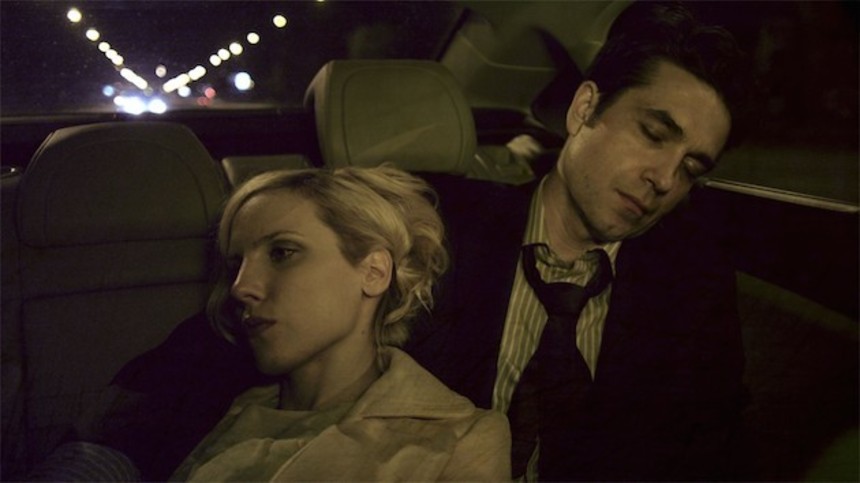Review: Emotional Drama LOVING Searches For Truth About The Mechanics Of Love

The sharply-written script goes beyond the surface in order to expose all the ingredients crucial for the formation and further development of a full-bodied relationship. Basing its premise on the foundation that even the slightest alteration in the trajectory of a seemingly blissful marriage might have catastrophic consequences, the film gives way to a slow-burn examination of the characters' inability to cope with a sudden tragedy that strikes violently like a bolt from the blue.
In a small town somewhere in Poland, a couple is expecting their first child. Maria (Julia Kijowska) and Tomek (Marcin Dorocinski) are at that point in their married life where even such common words as "happiness" couldn't possibly express those beautiful and strong feelings they have for each other. Evil lurks behind the corner, however, in the form of a hollow-hearted, obsessed, and mentally unstable man (Adam Woronowicz), who's not only the town's mayor, but also Maria's boss.
The illusory portrayal of a caring and well-mannered "man of the people" that he painted for himself over the course of years becomes his biggest ally when he commits a heinous crime and initiates a disastrous series of events that turn the aforementioned pair's stainless world upside down. Ultimately, the price that he pays is bleak in comparison with the crippling psychological struggle that takes place in Maria and Tomek's household. Without getting into spoiler territory, it's only crucial to mention that, although the incident happens very early in the film, it becomes a pivotal element of the storyline and sets the narrative on the right course towards dealing with the aftermath.
Lightning plays a key role in creating an uncomfortably intimate and dramatic atmosphere, whereas the minimalist art-piece aesthetics convey an emotional tone that is an important aspect in the relentless search for truth about the mechanics of love. Dimly-lit indoor scenes are jam-packed full of emotions and depth. Ironically, the purposely-created claustrophobic ambiance doesn't bring the characters closer together, but forces them to face their own feelings anew.
Although the story is pretty much straightforward and predictable from the beginning until the very end, the tension that arises between protagonists is the main source of the overwhelming power that the narrative builds upon. Loving's gradual transition from desperation to anger is delivered with much-needed urgency. Momentum crescendos right after Tomek leaves the house and begins plotting a revenge plan that soon turns him into a stalker. In order to come to terms with his own aggravating thoughts, jealousy-driven Tomek needs to go through various stages of an internal breakdown, albeit his predisposed inability to cope with certain anxieties leads him onto a path of willful hatred and silent self-destruction.
It's a role that has enormous potential to become an emotional powerhouse, but Marcin Dorocinski's inadvertent approach to a difficult subject diminishes the actual importance of the otherwise potent character. It seems as though in his mind Dorocinski is in a completely different place. His eyes never really acknowledge what's happening right in front of him, while the anger that occupies his crushed soul demands exposure, but gets it too late to make an impact. Though an impressive scene, it evokes nothing more than a desperate cry for attention. For all I know, betting on his acting skills is a rather risky move.
Julia Kijowska, on the other hand, finds the right balance between two roles that she has to play in order for her character to be believable. Both a loving yet slightly disoriented mother and a fragile, deeply afflicted woman trying to forget about the past, Maria's communication with the outside world goes beyond the verbal stage. Every eye twitch, every face expression confronts a totally different feeling, but what's even more important is that she never loses focus on her passion for the man who suddenly became very distant. Undoubtedly, Kijowska is on the right track to become the future star of Polish cinema.
The same thing applies for Slawomir Fabicki. Loving is the director's sophomore feature, but it already proves that he's very close to finding his own voice. Fabicki weaves a socially valuable tale with much consideration, trying to dig deeper into the roots of emotions. Although he's still far from explaining the mysterious mechanics of love that I referred to earlier, he knows how to grab the viewers' attention with a tactfully made drama that doesn't flinch from complex moral dilemmas.

Do you feel this content is inappropriate or infringes upon your rights? Click here to report it, or see our DMCA policy.






